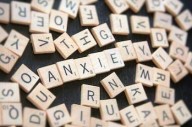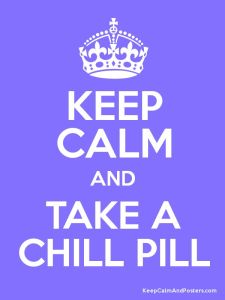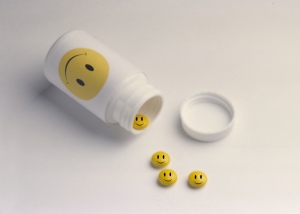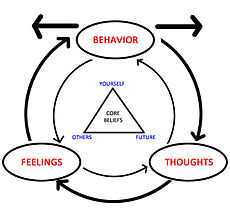I quite like to buck a trend, I’m proud to say I never read 50 Shades and I have never bought anything with the ‘Keep Calm and Carry On’ phrase plastered all over it (quite apt really), and my belief that anti-depressants can work just as well at treating mental health issues as counselling also seems to go against the grain. I mean, just imagine if I said that anti-depressants are better at treating depression and anxiety than therapy is? That would be outrageous, right? Could a drug with endless side effects that poisons your body actually be of more help than having a chat? Well that is the case with me and, yes, I’m ashamed to admit that. The stigma around anti-depressants is such that despite the medication working the treatment cannot work to its full potential as society has made anyone who needs drugs to tackle their mental health issues feel a failure, reinforcing the low self-esteem the sufferer is struggling to overcome. Not only that, medication is often considered a short-term solution for people suffering with clinical depression or generalized anxiety disorder. This can exacerbate feelings of uncertainty as there is the continual fear of being told you have to come off your tablets which makes you worry about how you will cope with this. But why aren’t anti-depressants a long-term solution? Why should I have to stop taking a medication that treats an illness I have? Should diabetics come off their insulin?
The best treatment for anxiety and depression differs from person to person and although I don’t want to criticise using counselling or CBT (Cognitive Behavioural Therapy) as a means of treating anxiety I do want to draw attention to the stigma around anti-depressants, a stigma that piggybacks on the stigma of having a mental illness in the first place. There is a glut of articles claiming that counselling is much more effective in treating depression than medication, but few, if any, offer the opposing view. This can make people like me, who take anti-depressants, feel weak and insignificant. Counselling reigns supreme in the eyes of many and even David Cameron, when recently tackled by Jeremy Corbyn on the need for improvement in mental health services, heralded CBT, but would he have been as comfortable singing the praises of Prozac?
Medication is NOT the easy way out
As an anxiety sufferer who uses anti-depressants to treat my illness I not only feel embarrassed about having mental health issues but also about how I cope with them. There’s no praise for me recognising I have a problem, seeking help for it and then treating it. Oh no, medication is the easy way out. If I’d solved my illness by talking about it I could shout it from the roof tops and everyone would be extremely proud of me. But no, I chose medication as that’s what works for me. This was by no means an easy decision. I have taken three different kinds of medication, with very different effects. The first anti-depressant worked well for me after the initial ‘it’ll make you feel worse before you feel better’ stage. But after a health scare about that particular drug I was changed onto a ‘safer’ one, which again worked well – so much so that I decided to slowly withdraw from it. I managed about a month off the medication before I started to slip. Nothing had happened in my life to cause this decline but I felt myself beginning to struggle again. My doctor advised going back on anti-depressants and she put me on another different kind. The next couple of days were the worst of my life. I tried to persevere and get through the initial stage which I knew from past experience was hard. But after having severe panic attacks which culminated in me fainting then coming round to a place I didn’t recognise (which wasn’t surprising as I didn’t know who I was let alone my own bathroom), I immediately stopped taking that drug and went back to the doctor. This clearly wasn’t the right anti-depressant for me.
Sometimes it can take a while to find the right anti-depressant but luckily my doctor realised what a bad experience I had had and instead of trying another different kind she put me back on the anti-depressant I had first started with nearly ten years previously, as we knew it had worked and would probably do so again. Thankfully there was no longer a scare about it – just as red wine can be good for you one day and bad the next, it seems anti-depressants are also subject to change. I am still on this anti-depressant now and I am stable, well and feel like me. I don’t feel completely at ease though, as I don’t have the security of knowing that for as long as I need this medication I can have it. There’s always that niggling worry that I will be told I can no longer take it and recently the issue has surfaced as I’m getting closer to wanting children and would need to consider whether to stop taking it, change to a ‘safer’ drug, or keep taking it and risk harm to the baby. So, yeah, medication is NOT the easy way out.
Being able to function again
Taking an anti-depressant is not ‘taking a happy pill’. They don’t make you happy – they make you able to function again. Which after having been so anxious it was a struggle for me to leave the house, I pretty much consider anti-depressants my life-safer.
Imagine having a panic attack one day out of the blue – actually scratch that. If you’ve never had one you can’t imagine the absolute horror of experiencing one, especially your first one when you are suddenly in a kind of hell you never imagined and have no idea what this thing is or how it happened. Then suddenly it’s not out of the blue, it’s every time you’re in the same environment you were in when the first one struck. For me that was a lecture theatre – trapped, unable to leave without everyone seeing. Next it’s cinemas and theatres. Oh and then it’s trains, buses, any place you can’t suddenly exit. So I don’t like being trapped. So why did it start happening when I was walking to the shops. I wasn’t trapped there – I was out in the open, out in the fresh air. But I was stranded, marooned. Unable to get to the safety of home in a minute or two. So I didn’t leave the house, I stayed where I was safe. But I was now trapped in the worst possible way, trapped in a fake existence where the only company was a mind that didn’t even feel like it belonged to me anymore.
Now try treating this by talking about it to a person you have never met, and actually don’t get to meet until a few months down the line when you get to the top of the waiting list. They tell you to draw a circle on a piece of paper connecting the words ‘thoughts’ ‘feelings’ and ‘behaviour’. Then you see how your anxiety is a vicious circle where your thoughts ‘Oh God, what if I panic on this train, I can’t get off’, affect your feelings – you start getting panicky and hot because you are thinking about it – result in your behaviour, for example getting off the train before the doors shut and it sets off. Then you’ve failed and you feel bad and you’re back to square one. For me I understood all that – I still understand it. I know how anxiety works and how it feeds my depression which then feeds my anxiety … etc. etc. Another cycle. But understanding it didn’t make any difference, I still panicked, I still felt down, I still couldn’t lead a normal life.
Taking anti-depressants means I can function normally, I still have the odd panic, I still feel miserable sometimes but I can hold down a job, have a social life and actually participate in this world. My thinking has changed, and I do use CBT alongside my medication. I know that my recovery is not all due to medication, my ability to understand anxiety and depression and try and change my thinking has also contributed. But without medication I’m not sure I would have been well enough to take these ideas on board and work with them.
Do we need chemicals or counselling?
What if depression and anxiety is in your biological or genetic make-up? Can it then be solved with counselling? The causes for depression are still not fully understood but some experts believe it can be genetically inherited. So how can talking and using different ways of thinking compete with your genes? My grandfather and uncle both suffered from depression, therefore my depression could be caused by genetics. Scientific research has also shown that certain activity in different parts of the brain can determine whether someone reacts better to treatment from therapy or medication. Could brain scans be the way forward in identifying the type of treatment that would suit the patient? Despite the theory of depression as a chemical imbalance in the brain being considered inaccurate by many scientists today, research is continuing to prove that depression is a very complex and multifaceted illness which may result just as easily from malfunctioning circuits in the brain as environmental factors. So just as the cause for depression can be different in different people, so can the right treatment method. If you are taking anti-depressants don’t feel ashamed. You have acknowledged your mental illness and sought treatment for it, which, in itself, should make you feel proud, not weak.





I was told that, at least in my situation, medication is there to aid the actual recovery. Anti-depressants are there to see me through treatment, such as, like you mentioned, CBT.
I used to take Prozac and I also used to take Citalopram; they didn’t ‘fix’ me. I liken anti-depressants (and some other medications) to a plaster over a wound, but that doesn’t necessary treat the wound, rather, it covers it up; a temporary fix.
Cleaning the wound up, putting cream over the wound, maybe stitches if necessary, then sticking plaster of sorts over it will do the job.
CBT did more for me than medication ever did, with the exception of Propranolol for my anxiety, but my anxiety seems pretty relentless almost no matter what I do; the only thing I seem to be able to accomplish, with regards to my anxiety, is to lessen the severity, but if that gives me a slightly better quality of life, then I’m all for it.
I feel anxious telling anyone I take or took medication for fear of judgement. I think there’s this idea that you must be proper bonkers if you actually need medication! Like, wowsers! Golly gee… medication! No way. Unheard of. Well, actually, it’s a thing… I don’t see why taking medication for the mind should be so far out from taking medication for the body.
LikeLike
Thanks for your comment. I do agree with your point that medication covers up the problem rather than fixing it but for me CBT didn’t really ‘fix’ it either. I do sometimes feel that I should ‘make the effort’ & come off my medication and learn how to deal with my anxiety and depression myself but even on medication I struggle sometimes and have to try and use CBT to help me. Hopefully I will get to the stage when I can manage it without medication but until then it would be nice not to feel ashamed that I need to take anti-depressants.
It’s such a tricky issue and I know lots of people will think I’m wrong to advocate medication over counselling but until there is clear scientific evidence that anti-depressants are ‘bad’ for you and that therapy is the only way to treat mental health issues long term I’m going to carry on taking my medication so I can live a ‘normal’ life and it would be nice not to feel bad about doing so.
I hope your anxiety improves, I found that so much worse than depression. So many people take being relaxed for granted and I remember wishing just for one hour free from my fears!
Anyway, thanks again for your comment. It’s good to discuss medication with someone after trying to hide the fact I take anti-depressants for so long.
LikeLiked by 1 person
No problem.
You’ve certainly no need to feel ashamed for taking medication, but I can understand why you do. I didn’t sort my depression out overnight, it took many years and some messed up events.
My anxiety is a bit like having some nasty little goblin fumbling around in my head, holding me back from things I wanna do. I’m not entirely sure I’ve ever been relaxed. It almost seems like the only time I’m ever relaxed is when I’m asleep, but I’m too busy sleeping to know about it!
I think some medication runs the risk of becoming less effective as time goes on, but don’t quote me on that, as I may be wrong.
LikeLiked by 1 person
I take anti- depressants for anxiety too. Even after I’d had such a severe panic attack I’d actually attempted suicide it took me months to accept trying trying them. When I look back at the ten months or so leading up to me starting on anti- depressants I’m terrified. I never want to have to go back to that state. And yet, my family don’t know I take them! I haven’t been able to bring myself to tell them!
LikeLike
Although I never attempted suicide, I understand how panic attacks and un-relenting anxiety can take you to the brink. I’m really glad that you are doing better now. I’m sure your family would rather have you here and well than the alternative. Anti-depressants can literally save lives and the stigma surrounding taking them needs to stop. Like you, I am terrified of the thought of going back to how I felt before I started taking anti-depressants and it’s sad that we have to consider this as medication is not always seen as a long term solution to mental illness. Don’t put yourself under pressure to tell your family, just concentrate on yourself then I’m sure you’ll know when you feel ready to talk to them about it. Thanks so much for your comments, it is reassuring to know that others feel as I do 🙂
LikeLiked by 1 person